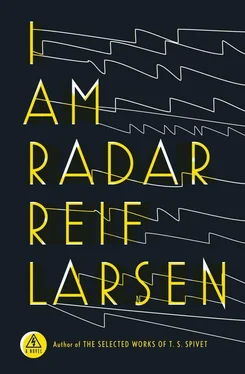“Yes,” she said, hurt. “Probably. I just finished last night.”
He put the pages down and cleared his throat.
“Charlene,” he said and looked up at her. “Is there anything you’re not telling me?”
She was startled by his question. “Like what?” she said.
“Really any information can be relevant,” he said. “If there’s anything you’re not telling me, it could delay us from our conclusion.”
She considered this. She briefly toyed with telling him about her olfactory condition. She had kept this from him. She had kept many things from him.
“I would tell you anything,” she said. “I mean, I’ve told you everything.”
“Have you?” He was coming around the desk.
“Yes,” she said, shrinking back into her chair. “I think so.”
He was standing in front of her. She closed her eyes. She could smell his aftershave. The hooked barb of musk. She could feel what was about to happen, and she was not sure how she felt about it. But when she opened her eyes again, he had moved to the window. The faintest shiver of rejection.
She went to him. Placed a tentative hand on his shoulder. She could see the false familiar of his reflection.
“Is there something you’re not telling me ?” she whispered.
“Are you acquainted with the principles of uncertainty?” he said suddenly.
“Yes,” she said, taken aback. She took her hand off his shoulder. “I mean — no, not really.”
“Heisenberg’s uncertainty principle,” he said. “People are often confused by it. Heisenberg stated that both the position and velocity of a particle cannot simultaneously be known. You measure one, the other will always remain uncertain. The observation affects that which is observed.”
“Okay,” she said. “What does this have to do with Radar?”
He walked past her to his desk. “This is where people confuse the issue. It’s not the act of observation which makes things inherently uncertain — it’s the system itself which is uncertain. We blame it on us, the observers, but this is merely a convenient excuse, for the uncertainty is actually built into the world. A particle can never have two definite attributes — direction and position. If you define one, the other fades into indeterminism. And so: there is no way to know everything. You must choose your knowledge.”
She could feel the tears. She willed them back, but they came anyway.
“But I’m not asking to know everything! I’m just asking for this one thing! I don’t care about anything else!” she cried. She took a step forward. “Wait, why are you saying all of this?”
“Heisenberg—”
“You don’t want to help us, do you?”
“Of course I want to help you. The question is, do you want to help you?”
“You never wanted to help us!”
“Charlene.”
“You don’t care about us!”
“Charlene, listen,” he said. “The Japanese have a saying: Shiranu ga hotoke .”
“What the hell does that mean?”
“You must be prepared not to know what you want to know,” he said. “You must be prepared for the question to be the answer.”
The nurse appeared at the doorway with Radar, who was proudly holding up his elbow, recently adorned with a Band-Aid.
“We didn’t have Popeye, but we had a bumblebee,” said the nurse.
“Popeye is bye-bye,” said Radar.
The nurse sensed her intrusion. “Is everything all right?” she asked.
“It’s fine. Everything’s fine,” said the doctor. “We were just finishing up.”
Charlene wiped at her eyes and sniffed. Perhaps it was from crying, but she could no longer smell him.
“Come on, Radar,” she said. “We’re leaving.”
“Charlene!” he called after her. “You forgot your pages.”
“Keep them,” she said without turning around.
• • •
IN THE WEEKS and months after, she fell into a kind of mourning. A month passed without any word from the doctor’s office. Charlene finally caved and called his secretary, who was polite but evasive. She said Dr. Fitzgerald had gone to Europe to promote his skin classification system. And no, she didn’t know when he would return. But she said this in such a way that it was clear she knew exactly when he would return and had been instructed not to share the information.
Two months went by. Then four. What could he be writing? During her visits, Charlene’s sense of smell had calmed somewhat, but now, as she waited for his article, it returned with a vengeance. Some days it was so bad she would wear a swimmer’s nose clip around the house. She found the mild sense of asphyxiation comforting. After dinner, Charlene would lean out their bathroom window and smoke cigarettes into the night. She had not smoked in years. The smoke tasted awful — the tarry remnants would linger and fester in her sinuses for days — but still she found herself leaning out that window again and again.
Sensing a weight he could not name, Kermin started to sleep several nights a week at his communications shop, tinkering away with dismantled cathodes and diodes and dusty vacuum tubes — the tender ligaments of long-distance communication. When he had nothing to work on, he passed the nights turning black-and-white televisions into color and back again.
Radar turned three. He was constantly speaking now, as if making up for lost time. His finger extended, he pointed at the world around him.
House, he said. Birdie. Doggy. Raisin. Man. Choo-choo.
After every word, he would look back at Charlene, seeking confirmation. Sometimes she wondered what would happen if she did not nod in agreement, if she instead taught him all the wrong words for things. What if a birdie became a man and a choo-choo became a raisin? She had the power to completely rewire his perception, to enclose him within a false reality. Except when she started to think about her son’s development in this way, she would feel the panic begin to rise — at all the choices she had and hadn’t made, all of the thousands of parental failures she would only come to realize later, when it was already much too late.
Time’s persistence had slowly dulled her preoccupation with the doctor’s verdict. Life settled into the uneasy routine of homebound motherhood, a life she had never thought would be hers. She woke; she made Radar breakfast; she took him to the playground; she made lunch; she read him a book; she napped with Radar; she went for a walk with Radar; she made dinner; Kermin came home; she put Radar to bed; she and Kermin watched television until he began to snore
Repeat.
Still, even if her day was consumed by the business of mothering, she couldn’t shake the feeling that she was still an impostor, as if all of this would be taken away from her at any moment. And a part of her wished it would be, even though she could not imagine her life any other way.
And then, nearly nine months after her final meeting with the doctor, on a day like all the rest, Charlene opened the mailbox and found a cream-colored envelope lying inside.
“Dr. Thomas K. Fitzgerald,” read the return address. She caught her breath and then tore open the envelope. The typewritten letter alerted her to a forthcoming article in the next month’s Journal of Investigative Dermatology concerning their son’s “chronic hyperpigmentation.” Standing by the mailbox, Charlene brought the paper to her nose. She searched for a hint of the doctor’s aftershave but found only the elliptical aroma of ink and his secretary’s cheap lilac perfume.
The wait each day for the mail’s arrival became excruciating. Charlene began to hate the mailman, shooting him looks of reproach when he did not deliver what she was looking for.
Читать дальше












